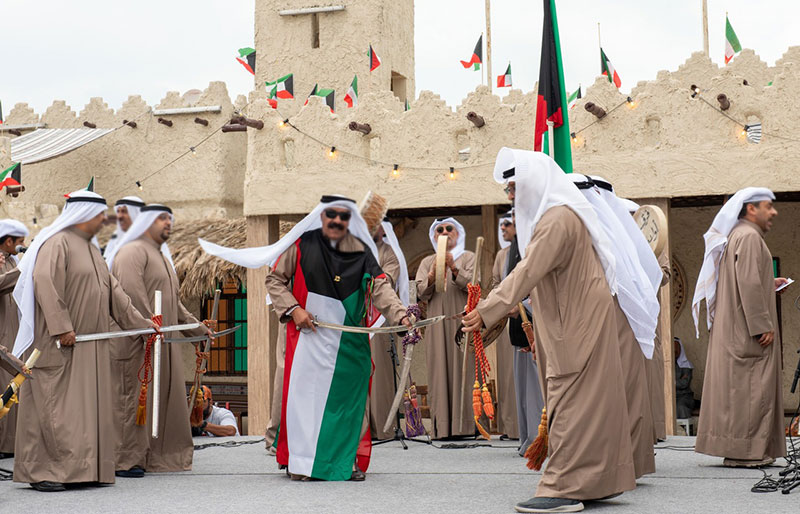Technology drives Kuwait’s rapid growth, from smart city initiatives to digital platforms that streamline daily life. Yet, even as the country embraces modern advancements, it remains deeply connected to its cultural roots. Skyscrapers and cutting-edge systems coexist with historic souks, forts, and traditional architecture. Modern Kuwait is a nation that demonstrates how progress can enhance, rather than replace, heritage.
Preserving Cultural Identity Amid Modernization
Despite rapid technological development, Kuwait remains deeply committed to maintaining its cultural identity. Traditional music, dance, and art forms are celebrated in festivals and cultural centers throughout the country. The annual Hala February Festival, for instance, brings together modern entertainment and traditional customs, demonstrating that progress does not mean abandoning heritage.
The government and private organizations actively support initiatives that document and showcase Kuwaiti history. Museums, heritage villages, and cultural exhibitions are designed to educate younger generations about the importance of their roots. Technology plays a role here as well, with virtual tours and interactive apps making cultural learning accessible to a wider audience.
Smart Cities and Digital Transformation
Kuwait’s urban landscape reflects its commitment to modernization. The rise of smart cities, equipped with IoT technologies, AI-powered systems, and sustainable infrastructure, marks a significant step forward. Public services, transportation, and energy management are becoming increasingly digitalized, offering citizens convenience while promoting efficiency.
Yet, the design of these urban spaces is carefully crafted to respect Kuwaiti aesthetics and traditional architectural elements. For example, new residential areas incorporate modern amenities without compromising the classic Gulf-style architecture, blending comfort with cultural identity.

Education and Technology Integration
Education in Kuwait is undergoing a remarkable transformation. Schools and universities are integrating technology into curricula, providing students with digital tools and online platforms to enhance learning. From AI-powered research tools to virtual classrooms, technology is fostering creativity, critical thinking, and problem-solving skills.
At the same time, educators emphasize the importance of cultural studies. Students learn about Kuwaiti history, literature, and customs alongside scientific and technological subjects. This dual approach ensures that the next generation is not only technologically proficient but also deeply connected to their cultural heritage.
Healthcare Innovation and Tradition
Kuwait’s healthcare sector exemplifies the balance between innovation and tradition. Advanced medical technologies, telemedicine, and AI-driven diagnostics are transforming patient care, making healthcare more accessible and efficient. Hospitals now use sophisticated systems to monitor patients and predict health risks, reducing waiting times and improving outcomes.
However, traditional practices and values are not overlooked. Respect for family involvement in healthcare decisions and cultural sensitivities remain central to patient care. This combination of modern technology with human-centered practices ensures a holistic approach to wellbeing.
Economic Diversification Through Technology
The Kuwaiti economy is increasingly embracing technology to diversify beyond oil dependency. Investments in fintech, e-commerce, renewable energy, and artificial intelligence are creating new opportunities for businesses and entrepreneurs. Startups are thriving, supported by government initiatives and incubators that encourage innovation while respecting ethical and cultural standards.
Traditional sectors, such as handicrafts, pearl trading, and fishing, are also benefiting from digital solutions. E-commerce platforms and digital marketing enable artisans to reach global audiences, preserving age-old crafts while making them economically sustainable.
Social Media and Cultural Exchange
Social media platforms in Kuwait are powerful tools for cultural expression and technological engagement. Young Kuwaitis actively share stories, art, and experiences online, promoting cultural awareness globally. Technology allows for a dynamic exchange between traditional values and modern trends, creating a vibrant community that honors its roots while exploring new ideas.
At the same time, authorities encourage responsible digital use, promoting awareness about the importance of preserving national identity and ethical online behavior. The careful guidance ensures that technology amplifies rather than diminishes Kuwaiti culture.
Sustainable Living and Smart Technologies
Sustainability is a key focus in Kuwait’s modernization journey. Smart technologies are being used to address environmental challenges, such as water conservation, energy efficiency, and waste management. Solar energy projects, smart grids, and eco-friendly urban planning are examples of how Kuwait is leveraging technology to protect its natural resources.
Yet, sustainability efforts are not solely technological. Traditional practices, such as water-saving irrigation methods and local construction techniques, are incorporated into modern projects. This integration demonstrates that environmental stewardship can honor both innovation and heritage.

Tourism: Tradition Meets Modern Comfort
Kuwait’s tourism sector reflects the seamless blending of technology and tradition. Modern hotels and resorts provide state-of-the-art amenities, while cultural attractions highlight the country’s rich history. Virtual reality experiences allow tourists to explore historical sites before visiting in person, enhancing engagement and accessibility.
Culinary tourism also thrives, with traditional Kuwaiti cuisine being promoted through modern platforms. Digital apps and social media campaigns make it easier for locals and tourists to discover authentic dining experiences, connecting people to the country’s heritage in innovative ways.
The Role of Government in Harmonizing Progress and Heritage
The Kuwaiti government plays a pivotal role in balancing modernization with tradition. National policies encourage technological development while safeguarding cultural heritage. Strategic investments in infrastructure, education, healthcare, and digital innovation ensure that progress does not overshadow identity.
Additionally, cultural preservation is supported through grants, awards, and public campaigns that celebrate traditional arts, music, and literature. By integrating heritage into national planning, Kuwait demonstrates that growth and modernization can coexist with respect for the past.
Challenges in Maintaining the Balance
Despite successes, Kuwait faces challenges in maintaining this balance. Rapid urbanization, global influences, and the pace of technological change can sometimes overshadow traditional practices. There is a constant need for awareness campaigns, community engagement, and education to ensure that modernization complements rather than erodes cultural values.
The younger generation, while tech-savvy, must also remain connected to their roots. Schools, families, and community organizations play a critical role in fostering this connection, ensuring that tradition remains a living, dynamic part of society.
Kuwait’s Vision for the Future
Looking ahead, Kuwait envisions a future where technology and tradition continue to thrive together. Initiatives promoting smart cities, digital education, sustainable development, and cultural preservation are aligned with a vision of progress that is both inclusive and respectful.
The nation is setting an example for other countries by demonstrating that embracing technology does not require abandoning heritage. Instead, innovation can enhance traditions, making them more accessible, relevant, and sustainable in the modern world.
Conclusion: A Harmonious Blend of Past and Future
Kuwait’s journey is a testament to the possibility of harmonizing technology and tradition. By valuing heritage, embracing innovation, and fostering a culture of respect and creativity, the nation has created a unique model of progress. Modern skyscrapers stand alongside historic forts, AI-driven systems operate in parallel with family-centered traditions, and digital platforms showcase the beauty of Kuwaiti culture to the world.
Ultimately, Kuwait shows that the future can be bright and advanced without losing sight of the past. It is a nation where technology and tradition not only coexist but complement each other, creating a society that is resilient, forward-thinking, and deeply rooted in its identity.
Do follow Gulf Magazine on Instagram.
Also Read – The Sea’s Powerful Role in Shaping Kuwait’s Cultural Identity



